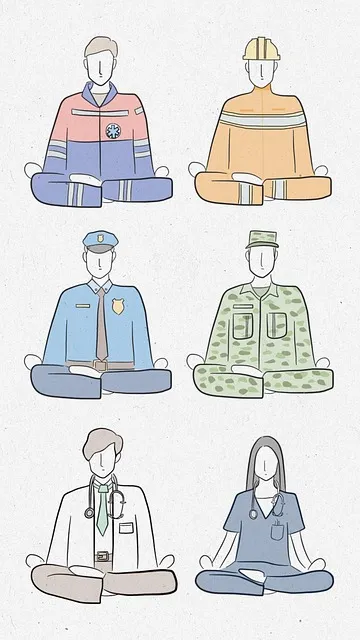Wheat Ridge Kaiser Permanente Psychiatry offers a holistic approach to mental health care centered around Resilience, Frequency, and Motivation (RFM). Through a multi-faceted methodology including Mind Over Matter principles, interactive activities, and Mental Wellness Coaching Programs, patients build resilience, learn coping mechanisms, and gain self-care skills. Success is measured through tracking engagement, stress level reductions, and improvements in mental well-being, with continuous adjustments based on feedback to ensure impactful, culturally sensitive care.
“Wheat Ridge Kaiser Permanente Psychiatry has emerged as a leader in integrating Resilient Factors Method (RFM) into mental health care, fostering resilience and mitigating challenges. This article explores the transformative power of RFM through three key sections. Firstly, we delve into understanding RFM’s impact on patient outcomes within Wheat Ridge’s psychiatry setting. Subsequently, a practical guide offers step-by-step instructions for professionals implementing resilience-building exercises. Finally, we examine successful measurement strategies and continuous improvement methods for RFM programs at Wheat Ridge Kaiser Permanente Psychiatry.”
- Understanding RFM and Its Impact on Mental Health Care at Wheat Ridge Kaiser Permanente Psychiatry
- Implementing Resilience-Building Exercises: A Step-by-Step Guide for Mental Health Professionals
- Measuring Success and Continuous Improvement in RFM Programs at Wheat Ridge Kaiser Permanente Psychiatry
Understanding RFM and Its Impact on Mental Health Care at Wheat Ridge Kaiser Permanente Psychiatry

At Wheat Ridge Kaiser Permanente Psychiatry, understanding the significance of Resilience, Frequency, and Motivation (RFM) is a game-changer in mental health care. RFM exercises focus on building resilience by helping individuals navigate life’s challenges with greater adaptability and flexibility. By fostering self-awareness exercises, patients gain valuable insights into their emotional responses, enabling them to make informed decisions regarding their mental wellness.
The implementation of these practices, often incorporated into the Mental Wellness Podcast Series Production and Mental Wellness Coaching Programs Development, has shown remarkable results. It empowers individuals to take control of their mental health, fostering a sense of agency and self-care. This approach ensures that patients develop sustainable coping mechanisms, enhancing their overall resilience and well-being, both within and outside the clinical setting.
Implementing Resilience-Building Exercises: A Step-by-Step Guide for Mental Health Professionals

Implementing Resilience-Building Exercises: A Practical Approach for Mental Health Professionals
At Wheat Ridge Kaiser Permanente psychiatry, we understand that fostering resilience is a cornerstone of mental wellness. To support individuals in managing their mood and enhancing their overall mental wellness, we’ve developed a step-by-step guide for incorporating resilience-building exercises (RBE) into therapeutic practices. The process begins with Mind Over Matter Principles, encouraging clients to challenge negative thought patterns and reframe them with positive affirmations. This lays the groundwork for cultivating a resilient mindset.
Next, mental health professionals should facilitate interactive activities that promote coping strategies tailored to individual needs. These can range from mindfulness exercises, such as deep breathing and meditation, to creative outlets like art therapy or journaling prompts. Over time, Mental Wellness Coaching Programs Development becomes integral, helping clients translate learned skills into real-world applications. By combining these approaches, mental health professionals at Wheat Ridge Kaiser Permanente strive to empower individuals with the tools needed to navigate challenges and thrive in their personal journeys towards mental wellness.
Measuring Success and Continuous Improvement in RFM Programs at Wheat Ridge Kaiser Permanente Psychiatry

Measuring success and fostering continuous improvement are vital aspects of any resilience-building program, particularly at Wheat Ridge Kaiser Permanente Psychiatry. They employ a range of metrics to assess the effectiveness of their RFM (Resilience, Flexibility, and Mindfulness) initiatives. This includes tracking participant engagement, changes in stress levels, and improvements in overall mental well-being through self-care practices. By collecting qualitative feedback as well, they gain insights into the impact of these programs on patients’ daily lives, including the integration of cultural sensitivity in mental healthcare practice.
Regular reviews and adjustments ensure that the RFM exercises remain relevant and impactful. The team encourages open dialogue with participants to understand what works best for them, allowing for personalized approaches to stress reduction methods. This iterative process enables them to continuously enhance their programs, catering to the evolving needs of their diverse patient population at Wheat Ridge Kaiser Permanente Psychiatry.
The implementation of Resilient Factor Model (RFM) exercises at Wheat Ridge Kaiser Permanente Psychiatry has shown significant positive impacts on mental health care. By integrating RFM into treatment plans, professionals can empower individuals to build resilience and navigate life’s challenges more effectively. The step-by-step guide provided offers a practical framework for mental health practitioners to adopt these techniques. Furthermore, continuous improvement through measured success ensures that the programs at Wheat Ridge Kaiser Permanente Psychiatry remain innovative and tailored to individual needs, fostering a healthier and more resilient community.






